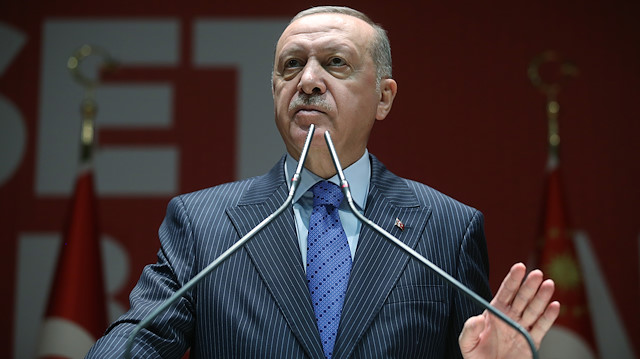
Turkish president says Turkey has also reversed situation in Libya, which was previously in favor of Libyan warlord Haftar
The situation in Syria’s Idlib is in favor of Turkey, said the Turkish president on Thursday.
“The developments in Idlib are now in favor of Turkey,” Recep Tayyip Erdogan said during orientation day of first batch of Diplomacy Academy in his ruling Justice and Development (AK) Party headquarter in Ankara.
On Jan. 12, the parties to the conflict in Syria announced a cease-fire in response to a joint call by Turkey and Russia.
Syria has been mired in a vicious civil war since early 2011, when the Bashar al-Assad regime cracked down on pro-democracy protests.
Since then, hundreds of thousands of people have been killed and more than 10 million others displaced, according to UN figures.
Idlib, near Turkey's southern border, falls within a de-escalation zone laid out in a deal between Turkey and Russia in late 2018.
The Syrian regime and its allies, however, have consistently broken the terms of the cease-fire, launching frequent attacks inside the territory, where acts of aggression are expressly prohibited.
The de-escalation zone is currently home to around four million civilians, including hundreds of thousands displaced in recent years by regime forces throughout the war-torn country.
Some one million Idlib refugees have moved towards the Turkish border in recent months, fleeing attacks by the Assad regime and its allies, which caused a desperate humanitarian situation.
Turkey has called for an immediate halt to the attacks on Idlib and for the cease-fire to be followed, warning that if the attacks do not stop, Turkey will act.
“We have also reversed the situation in Libya which was previously in favor of [Libyan warlord Khalifa] Haftar,” Erdogan said.
Since the ouster of late ruler Muammar Gaddafi in 2011, two seats of power have emerged in Libya: Haftar in eastern Libya, supported mainly by Egypt and the United Arab Emirates, and Government of National Accord (GNA) in Tripoli, which enjoys UN and international recognition.


